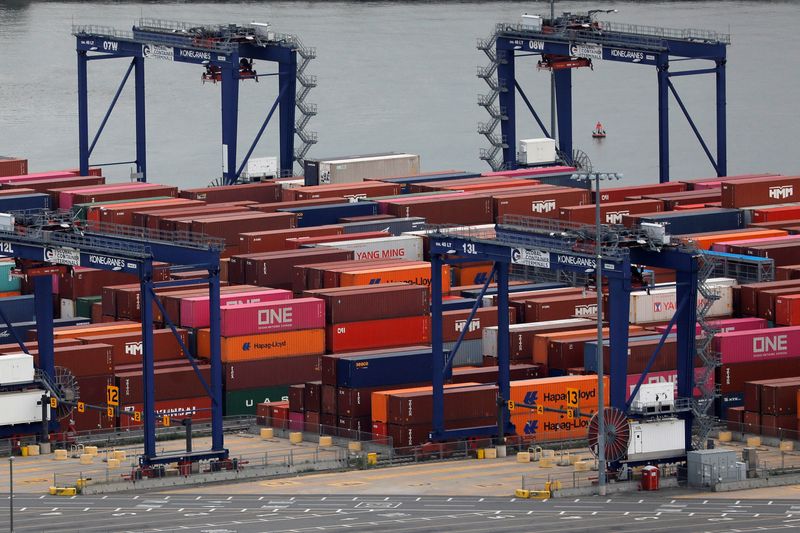Agriculture groups urge White House to avert East Coast port strike
By David Shepardson, Jarrett Renshaw and Karl Plume
WASHINGTON/CHICAGO (Reuters) -Agriculture organizations on Wednesday urged the White House to take action to avert a potential Oct. 1 strike at U.S. East and Gulf Coast ports that handle roughly half of the country's ocean trade, including consumer staples like coffee, meat and eggs.
Dozens of groups including the American Farm Bureau Federation, Renewable Fuels Association and American Chemistry Council said "the time has come for the U.S. government to intervene and ensure port operations do not stop" in order to prevent damage to U.S. agriculture and the economy.
Republican Senator Ted Cruz cited a JPMorgan analysis that projected a port strike could cost the U.S. economy $5 billion daily, and warned that the U.S. "teeters on the brink of the first union strike among East and Gulf Coast ports since 1977."
Cruz hails from Texas and represents the district that includes the Port of Houston, one of 36 seaports at the center of labor talks that appear to be deadlocked over worker pay.
Threatened work stoppages could also affect other busy ports like New York and New Jersey; Savannah, Georgia; and Norfolk, Virginia, and spell trouble for an ocean shipping network already stretched thin due to rerouting ships around Africa to avoid Houthi militant attacks on vessels near the Suez Canal.
U.S. companies that rely on East and Gulf Coast ports have been scrambling for workarounds ahead of a threatened strike.
The current contract between the International Longshoremen's Association union, which represents 45,000 port workers, and the United States Maritime Alliance, which negotiates for employers at ports from Texas to Maine, expires on Sept. 30.
A threatened strike would land just weeks ahead of the U.S. presidential election between Democratic Vice President Kamala Harris and Republican former President Donald Trump.
The White House did not immediately comment on the agricultural groups' request.
"We are monitoring and assessing potential ways to address impacts to U.S. supply chains related to operations at our ports, if necessary," White House spokesperson Robyn Patterson said on Tuesday. President Joe Biden's administration has said the president does not intend to invoke a federal law known as the Taft-Hartley Act to prevent a strike.
Any delays and costs tied to a strike could quickly snowball, endangering a broad swath of industries, including retail, manufacturing and food.
About 14% of all U.S. waterborne agricultural exports, by volume, would be at risk from a strike. Over a one-week period, the potential value of those exports is estimated at $318 million, the Farm Bureau said in an article.
Additionally, 53% of U.S. waterborne agricultural imports, by volume, are vulnerable to a strike, leading to a potential economic impact of over $1.1 billion per week, the group said.
A prolonged strike could result in shortages of familiar items like bananas, coffee and cocoa, which over time could translate to higher grocery prices.
It could also mean lost export sales of key agricultural products including beef, pork, chicken and eggs. American consumers, however, could benefit if those perishable products are dumped onto the domestic market as producers employ a "sell it or smell it" strategy.
Of the nearly $5.5 billion in U.S. poultry meat products exported last year, two-thirds was shipped from East and Gulf Coast ports, according to U.S. Customs data and the USA Poultry & Egg Export Council.
"The U.S. consumer could be a marginal beneficiary at the egg and meat counter," said Sterling Smith, director of agricultural research at AgriSompo North America.
"However, those gains may be more than offset by problems with coffee and cocoa."
Source: Investing.com
